- Home
- A. C. Crispin
V Page 7
V Read online
Page 7
Putting out an unsteady hand, Robert touched fingertips to the stain, then sniffed them cautiously. Bile flooded his mouth, and if his stomach hadn't been empty, he'd have vomited. He spat on the cement, then spat again, then leaned back against the Granada's rear door, feeling dizzy, emptied.
Footsteps . . . quick, heavy. The campus cop Robeson. "You Maxwell?"
Robert swallowed, scrubbing the foulness of that oily stain off on the roughness of his jeans. "Yes, I'm Doctor Maxwell."
"This Quinton's car?"
"Yes, it is. I found his keys in the ignition."
Robeson took the key ring with a reproachful tchh of his tongue. "Shouldn't have touched it, Doc. There might be fingerprints."
"Sorry." Maxwell's shock was turning to grief now, a paralyzing sense of certainty that he'd never see Arch again. He tried to think rationally, convince himself that Quinton would have called to explain everything by the time he got back inside, called Kathy, but he couldn't.
The cop was inspecting the interior of the car. "Never saw anything quite like this. I'd better call L.A.P.D. right away." He peered at Maxwell. "You gonna be okay, Doc?"
"I'm all right," Maxwell said, untruthfully.
"This is weird," Robeson said. "You got any idea what might have happened to him?"
"No." Maxwell found he was shaking again as the breeze brought that smell to his nostrils again. "God, no."
"I'll call L.A.P.D.," Robeson said, then added kindly, "you better sit down, Doc."
The afternoon sun slanted through and spattered itself in a yellow haze against the oyster-white wall of Kristine Walsh's Los Angeles loft apartment. Mike Donovan sat on the sofa, checking and packing his camera equipment. Kristine, in bra and half-slip, was in the other room, putting on her makeup. Her monologue was broken into uneven bursts of speech and pauses as she squinted in the mirror, daubing carefully at her eyes and mouth.
". . . and then Diana said that she was pleased with the progress at the Richland plant. Said it was representative of all the others around the world." She widened her eyes, touching sable mascara to her lashes in quick brushing gestures.
Donovan's voice reached her from the living room. "Did she mention that she'd postponed the seminars for the scientists a second time?"
"Yes. She said they'll be beginning them shortly."
Donovan made a rude noise. "That's what they said the other time."
"But wait, Mike, I haven't told you the best part." Kristine tilted her head, examining her blusher critically. "Then Diana said, 'The other thing I'm pleased with here, Kristine, is you.' I didn't know what to say, what she was getting at, you know. Then she explained that of all the journalists they've met since they've been here, the Visitors feel most comfortable with me. She said, 'Our research also shows that your people have a lot of confidence in you. You're trusted and respected . . . attractive—' "
"So is Lassie," snapped Donovan. "What's that got to do with anything?"
"Well, she told me those qualities were essential in the person they selected as the official Visitor spokesperson—and then she offered me the job!"
"Huh?"
"Or Press Secretary . . . She said I could call it what I wanted. Which do you like?"
There was a long pause. Donovan's voice, when he finally spoke, sounded tight. "I don't much like the sound of either one."
Kristine gave a final pat to her hair, then pulled on her tan wool skirt and the dark brown striped blouse. "Come on, Mike. You're jealous."
"The hell I am. Don't be a jackass, Kris! I don't understand why you'd even consider it!"
"They want someone the public trusts . . . and I think it's an excellent career move." She walked past him into the living room, and, picking up her purse, began checking the contents.
Donovan looked over at her. "What about your objectivity?"
"What?" Notebook, she thought, tape recorder . . . lipstick . . . where's my pen?
Mike's tone was hard, one she'd only heard a few times before—usually when someone asked him a question about his divorce. "Don't you think you're compromising your objectivity by sucking up to those—"
She whirled to face him. "I'm not sucking up to anybody!"
His eyes were troubled. Kristine came over and knelt in front of him so she could look directly at him. "Don't you see? It's the perfect opportunity to really get the inside stuff! Exclusive stuff . . . material that no one else has access to! I'm sure to get a book out of it, at the very least!"
She took his hands in hers. They were limp, unresponsive, and his face still wore that shocked, puzzled expression. She tried to reassure him. "I'm going to stay objective, Mike. After all, I'm one of us, not them."
He looked down, stubbornly refusing to meet her eyes again. Kristine gave his hands a squeeze—then a shake. "Oh, come on, Mike! Any good reporter would be crazy not to jump at this!"
His green eyes, when they met hers again, were full of challenge. Kristine bit her lip. "I'd like to think I had your backing, honey. You know how I respect you." Her hand moved to brush his cheek, lingering for a moment against the freshly shaven smoothness. "More than respect . . ."
Donovan looked down at his hands, slowly extricated them from her fingers. "You'd better put the steaks back in the freezer, Kris."
Her mind flashed back to the conversation with Diana. "Oh yeah. Tonight's a problem—the last thing Diana mentioned was that she'd send a shuttle for me so we could meet. How did you know?"
He stared at her for a long moment, and slowly his meaning dawned. Kristine moved blindly to look for her pen, eyes blurring, holding her shoulders stiffly erect. After a second he closed his camera bag, then went back into the bedroom. She heard him packing.
"Damn," she whispered, and was horrified to hear her voice crack. "Damn, damn, damn . . . damn!"
She didn't turn around until the apartment door closed behind him.
Chapter 6
William the Visitor looked out across the cryogenics section to see a familiar blonde head halfway across the compound. He smiled, the expression coming unconsciously now. His bootheels rang on the steel catwalk as he trotted down the stairs and over the pavement. Harmy had apparently seen him coming, and stood waiting, the familiar tray in her hands. William nodded shyly. "Hello."
"Well, hello yourself. How are you doing?"
"Fine, fine." He smiled. "I like to thank you again for your help. Without you, I would have stayed 'just'—probably forover."
She giggled. "Forever, Willy. But listen to you! Only a week here, and your English is better than mine! You guys really learn fast."
William nodded. "We are told to practice all the times. How are you today?"
"Okay—same old, same old. How are you getting along with that guy? He didn't look any too thrilled t'see you, the other day."
William shrugged—another gesture he'd picked up from the humans. "Caleb Taylor is good worker. He knows a lot about refinery equipment. But I don't think he lives us being here."
"Likes. He treating you okay?"
William shrugged. Harmy's face fell. "That's too bad. I know what it's like t'work with people who are down on you. I had a boss once who—"
An explosion rent the air, and the ground shook beneath their feet. A Klaxon screamed. William instinctively jumped between the human and the blast, but they were too far away to be hurt. One quick glance told William that it was his own work area!
He began to run, shoving past panicked workers and Visitors alike. Shouts and screams challenged the alarm Klaxon's shriek. He'd been working with Caleb Taylor and Gus Jennings—and they weren't among the crowd!
"Caleb!" he shouted.
White clouds of frozen vapor and supercooled gases poured out of the hatch as William reached the stairway to the catwalk. A shape darkened the opening—Gus Jennings! The burly worker staggered out, his mouth working as though he was screaming, but the whoosh of the gas drowned out even the alarm. Jennings was covered with white frost, clutching his arm a
bove the wrist. Even as William started up the stairs, the human lurched, his hand smashing into one of the steel pipes.
Both William and Jennings stared unbelieving as the impact shattered the flesh like so much glass. Jennings was left clutching a bloody stump. William was close enough now to hear his screams.
Even as he reached Jennings, shouting "Caleb?" the man collapsed. Bill Graham, another worker, caught him.
"Caleb's still in there!" He eased Jennings onto the catwalk, shouting down to the men on the ground, "Get an ambulance, for God's sake!" Graham turned back to William. "The liquid nitrogen blew through the inner seal—there's no way anyone can get past it to reach him!"
William stepped over Jennings, heading for the hatch and the billowing frozen gases. Behind him he could hear Graham's shout. "William! Stop! For God's sake!"
William hesitated for a brief second, filling his lungs with a deep breath, then plunged inside.
Graham watched him go, torn between trying to stop the Visitor technician and tending to Jennings. He turned as a hand grabbed his shoulder. "What's happening?"
It was Steven. Graham gestured helplessly. "William went in there after Caleb!"
"What?" Steven glanced into the frozen darkness of the hatchway, his features hardening.
Graham stripped off his coat and laid it over Jennings, who was still unconscious, but moaning now. "It's got to be three hundred below zero in there—they're both goners. Nothing human could—" Graham broke off in confusion as he stared into the Visitor officer's eyes. They were flat and cold-shards of ice in that otherwise handsome countenance.
Shouts echoed around them, and both Graham and Steven turned to see what was happening. William emerged from the hatchway, supporting Caleb Taylor. The older man seemed barely conscious, his dark skin and hair frosted white. He twitched uncontrollably as bouts of shivering hit him.
Bill Graham moved quickly to help William lower Caleb to the catwalk. The Visitor technician seemed unharmed, except for his face and hands, which were covered with large, bumpy blisters, whitish in color. Dark cracks seemed to furrow the skin around the raised areas. Graham glanced quickly at Jennings—then at Caleb. Though both men were rimed with frost, their skins roughened by the frostbite, neither displayed those disfiguring blisters.
William, catching Graham's eyes on his face, turned away, ducking his head. Steven leaned over him, blocking Bill's view of the technician.
"The ambulance is coming!" The shout was followed almost immediately by a wail, then the screech of brakes below the catwalk. Graham looked over to see the paramedics pile out. "We'll need three stretchers up here!" he shouted.
"You'd better sit down, William," he said. "The ambulance is here. Are you in much pain?"
The Visitor technician didn't raise his head. His voice sounded even stranger than usual—a high-pitched, muffled tone accompanied the usual reverberation. "No. I am okay."
"I'm taking him back to the shuttle," Steven said. "Our doctors will deal with this."
"Don't you think—" Graham caught the Visitor officer's eye and stopped abruptly. Perhaps it was a blast of the frozen vapor from the open hatchway behind him that made him shudder suddenly, violently.
Doctor Benjamin Taylor sat at a microscope, peering intently into the eyepiece. Ruth Barnes sat across the laboratory from him, labeling specimen dishes. The door banged open to reveal Doctor Metz. "Where are those cultures, Ruth? I can't proceed without them!"
Ben glanced over at the middle-aged woman, saw pain, quickly hidden, shadow her eyes at Metz's brusque tone. "They're not back from pathology, Doctor."
Taylor saw Metz's frown deepen—hastily spoke up in Ruth Barnes's behalf. "They're running way behind there, Doctor Metz."
She nodded. "I heard that two of the top technicians didn't show up for work today. They didn't even call in!" Ruth, who hadn't missed a day of work since Ben had first known her when he was still a med student, sounded scandalized.
Metz pursed his lips. "That's odd. Who are they?"
"Morrow and Prentiss."
"I must say, with their work records, I'd never have expected such a cavalier attitude from them." Metz shook his head.
"Maybe there's a good rea—" The laboratory phone interrupted Ben. He picked it up. "Doctor Taylor here."
He recognized Juliet Parrish's voice, but couldn't recall ever hearing it so strained and anxious. "Ben—get down to the ER, stat. They just brought in your father."
When the three reached the emergency room, Caleb was conscious, barely. Ben clasped his father's hand, shocked at how dreadfully cold it was, while he listened to the ambulance technician summarize the accident at Richland. "How did he get out of there?" Ruth asked.
"One of the Visitor technicians carried him out, apparently," answered the paramedic. "He was damn lucky. Those supercooled gases are kept at temperatures hundreds of degrees below zero. I don't know how the hell the guy managed to get in there and keep moving—he should have been a Popsicle within seconds if he had to pass through blasts of liquid nitrogen."
Ruth leaned forward, peering intently at Caleb's jacket. Whitish flakes adhered to it—some residue of the chemical? she wondered, scratching at one cautiously. On impulse she picked up a sterile specimen case and a pair of forceps, and scraped several of the larger flakes into the glass. She'd examine them later, under the microscope.
They almost look like skin, she thought, stepping back from the rush of monitors and doctors that surrounded Caleb Taylor. But not quite . . .
She remembered the paramedic's statement that it had been one of the Visitors who had rescued Caleb. Visitor skin? she thought excitedly. Rudolph will want to know about this! She turned to mention her suspicion to him, but he was no longer in the room. On impulse, she decided to analyze and examine the samples herself first, before telling him. No sense in getting him all excited unless she was sure what she had . . .
Caleb moaned, then spoke. "Ben?"
"I'm here, Pop. You're going to be okay."
Quietly, Ruth turned and tiptoed from the room, slipping the sample case into her pocket.
Abraham Bernstein ambled slowly along the street, the afternoon sun baking his shoulders beneath the worn old sweater. His companion was Ruby Engels from across the street. She was a widow, and each day the two walked the two miles to the neighborhood shopping center and back. They rarely bought anything—Social Security checks barely paid for the necessities. But it was a nice walk.
Abraham glanced up as a Visitor squad vehicle cruised by overhead. "More of them every day," he commented.
Ruby nodded. "You get so you don't even notice them on the street anymore. It's like when my husband and I first moved here from Germany. I had never seen a black, and it was all I could do not to stare. Within a couple of months several of the ladies I rode to the market with were black, and I never gave it a second thought."
Abraham shook his head. "It's not the same, though. These people are from a totally different world, one you and I, at least, will probably never live to see. They aren't human." He looked over at two Visitors standing casually on a street corner. "All those uniforms. And more every day. I don't like uniforms."
Ruby took his hand in hers, giving it a little shake. "Abraham, it's been nearly forty years." Her fingers pressed the inside of his forearm, where she knew the faded tattooed numbers were. "This—and everything it represents—belongs to the past. You have to let it go."
Bernstein shrugged. "Maybe you're right, Ruby. Still—I don't like uniforms. And there are more of them every day."
With a sigh, Ruby changed the subject. "What is your grandson doing these days?"
"Nice try, Mrs. Engels. But you picked the wrong subject. Daniel . . . Daniel." Abraham kicked desultorily at a pop top on the concrete. "He lost the job at the supermarket. When the register came up short, he thought they were blaming him, so he quit before they could say anything. I've lost count of all the jobs he's quit."
"Abraham." Ruby didn't look
at her companion. "Is it possible that Daniel was . . . guilty?"
Instead of the hot denial she expected, Abraham sighed again. "I don't know, Ruby. He's my own flesh and blood, and of course I don't think he'd steal. His father and I have done everything we could to teach him what's right in this world. But—he just never has fit in."
She touched his bent shoulder quickly. "Don't be so hard on him, Abraham! He's only eighteen."
"But he's been this way for years! No good in school . . . hardly any friends . . . can't keep a job, or stick to a task . . ."
"Didn't you tell me that he's gotten involved with this Visitor Friends group?"
Abraham was obviously less than thrilled. "Yes."
"Well, maybe this will be just what he needs. He hasn't found his niche yet. You wait. This may be it."
Abraham Bernstein didn't look reassured. Another squad vehicle whispered by overhead, its shadow blotting out the sun for a second.
Michael Donovan sat in the passenger seat of the Visitor shuttle, looking down on the streets and the people below. He saw an elderly man and woman, then they were gone. He glanced over at a large, imposing house with a beautiful, professionally landscaped garden. Eleanor's house. Another Visitor craft rested on the front lawn.
His pilot, a Visitor officer named Martin, also glanced over at the shuttle. "That's Steven's vehicle below." He adjusted a control without glancing up. "I hear the supervisor visits there a lot."
Donovan smiled wryly. "She can be charming." He wasn't sure if Martin knew that Mrs. Dupres was his mother. It was possible—Martin, from Donovan's uneducated reading of his insignia, seemed to have a fairly high rank. If the Visitors were anything like humans, they probably gossiped among themselves.
He busied himself watching the pilot handle the controls. The craft seemed simple to fly. A bar with a handgrip controlled the direction, a lever set within a notched slot regulated the speed. The slot nearest to the pilot was the slowest—cruising speed. Donovan wondered idly what the top acceleration on these babies was . . .

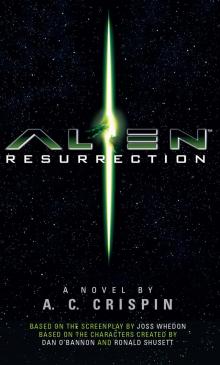 Alien Resurrection
Alien Resurrection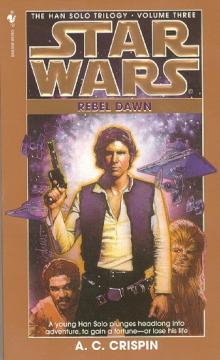 Star Wars - The Han Solo Trilogy - Rebel Dawn
Star Wars - The Han Solo Trilogy - Rebel Dawn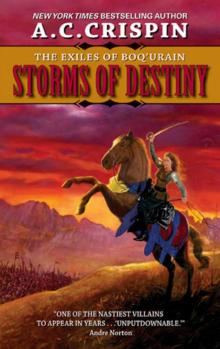 Storms of Destiny
Storms of Destiny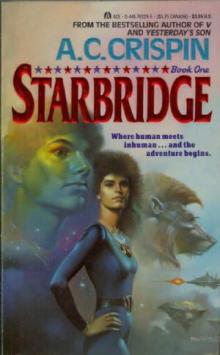 Starbridge
Starbridge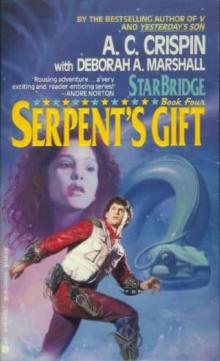 Serpent's Gift
Serpent's Gift Pirates of the Caribbean: The Price of Freedom
Pirates of the Caribbean: The Price of Freedom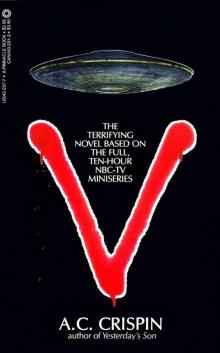 V01 - V
V01 - V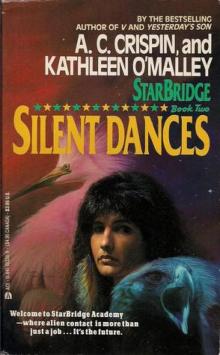 Silent Dances
Silent Dances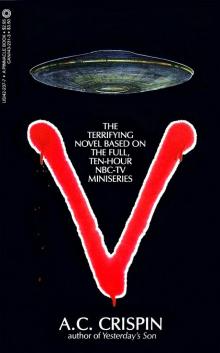 V
V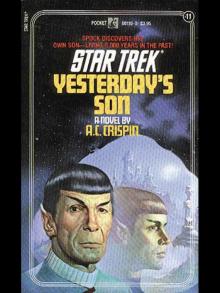 Yesterday's Son
Yesterday's Son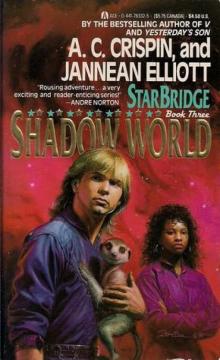 Shadow World
Shadow World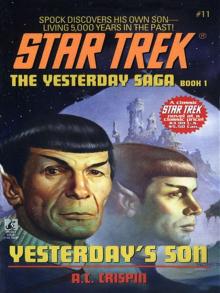 STAR TREK: TOS #11 - The Yesterday Saga I - Yesterday's Son
STAR TREK: TOS #11 - The Yesterday Saga I - Yesterday's Son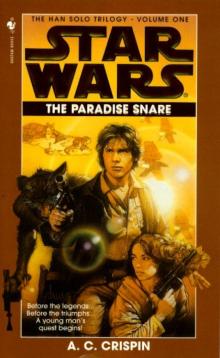 Star Wars - Han Solo Trilogy - The Paradise Snare
Star Wars - Han Solo Trilogy - The Paradise Snare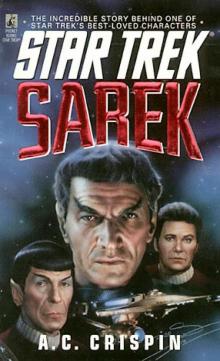 Star Trek - Sarek
Star Trek - Sarek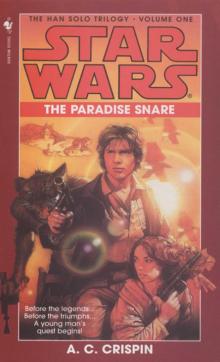 Star Wars: The Han Solo Trilogy I: The Paradise Snare
Star Wars: The Han Solo Trilogy I: The Paradise Snare